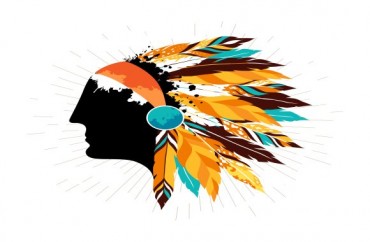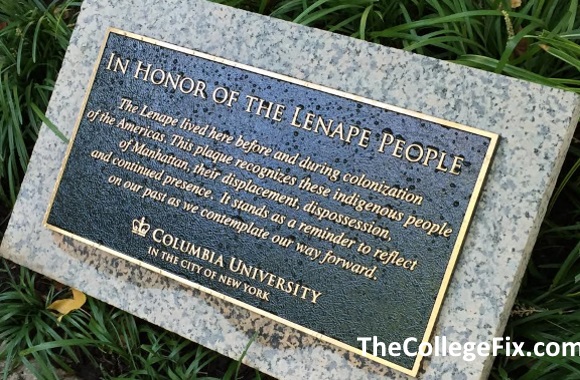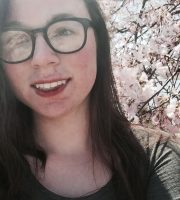
UPDATED
Supporter is wary of their demand to rename buildings
For five years, a secretive group that claims to represent Native American students at Columbia University has been steadily winning concessions from the administration.
Emboldened by those victories, it is making a demand that appears to have only been made once before by a Native American college group: reparations.
The controversial idea showed up on a list of demands given to the administration last month by the Columbia Native American Council, according to the Columbia Spectator.
The demand for reparations comes just weeks after the administration acquiesced to the council’s demands for a plaque lamenting the colonization of the land upon which the university sits.
The council had been demanding a plaque of recognition from the administration since at least 2013, when it circulated a petition garnering more than 300 signatures.
It has yet to actually make its latest demand list public, with the Spectator the only known source of the list’s contents.
The council has not publicized its demands on its Facebook or Twitter accounts, which are actively maintained, and it has not returned repeated College Fix requests for comment.
The Fix could only find one other Native American campus group that had asked for something comparable to reparations from its administration.
In 2012, the Northwestern University Native American and Indigenous Student Alliance demanded that the school:
Create a scholarship fund for the Arapaho and Cheyenne, and actively recruit Native students to Northwestern; 2 students from the Arapaho and Cheyenne Nations are to be admitted on full scholarship with each undergraduate class.
MORE: Columbia dedicates campus plaque lamenting Manhattan’s ‘colonization’
The Columbia list also demands the university remove campus statues of Alexander Hamilton and Thomas Jefferson; hire an adviser specifically for them; institute a “fly-in” program for indigenous high-school students; and rename certain buildings on campus, such as the school gym and some academic buildings, according to the Spectator.
“It wouldn’t be too much to ask to change the name of a building [named after someone] that sold guns to frontiersmen,” council member Noah Ramage told the newspaper. “Or to generals that fought against Native people in the frontier.”
The group’s demands also call for the creation of a Native American Cultural Center on campus as a formal meeting place for indigenous students, and the establishment of a “Native Studies” department.
A history of secrecy
The council, which does not publicly identify its members, appears to have made its first public appearance in 2011 when it reported a bias incident to the administration.
Native American students confronted a student who was wearing a headdress at a homecoming game, according to a Spectator report then. (The newspaper has no prior mention of the council.)
When those students asked the offender to remove the headdress, that person’s friend allegedly responded by making a “tomahawk chop.” Council members declined to give individual interviews to the Spectator then, speaking only through council statements, the newspaper said.
In 2012, the council successfully lobbied to secure a brownstone on campus for Native American students. Their Manhattan House joins Casa Latina and Q-House (Queer House) as identity-based living arrangements.
MORE: Columbia Native American group wants reparations from college
Two years later, the council posted flyers around campus that said “Columbus Day: Lies Written in Native Blood,” though Columbia does not observe Columbus Day.
Over the next two years, its members penned numerous op-eds. For example, they called for more “Native representation” among admitted students and argued that Columbia should officially recognize Indigenous Peoples’ Day.
‘Profoundly disrespectful’ to not give reparations
Columbia junior Sorangel Liriano supports the demands.
“Native students will benefit from a Native American cultural center, scholarships to encourage native students to apply to Columbia, and from a Native Studies department,” she told The Fix in an email, referring to some of the demands.
“Often times we see that some voices, like the Native American voice, are silenced in western canon-driven learning environment at Columbia,” said Liriano, who is not Native American: “Columbia could set the precedent for other universities.”
However, she expressed concerns over the demand to rename buildings and move statues, calling them “grounded in the history of Columbia. I am not sure how much the University would agree on destabilizing these structures.”
Emmanuel Hiram Arnaud, a Latino who graduated from Columbia in 2013, also supports reparations.
“As a result of Columbia’s direct, and in some instances indirect, role in the indigenous genocide, [the council’s] request to help indigenous students have a seat at the table– a table built on the blood of their ancestors — almost seems like the least they could ask for,” Arnaud, who was not a member of the council as a student, told The Fix in an email.
“If the administration does not address NAC’s concerns, it would be received as a profoundly disrespectful action and a continuation of our country’s intentional blindness to the needs of the communities Americans have destroyed,” he said.
A spokesperson for the administration told The Fix had had “received the petition, and will review its content, but we have no other comment.”
The Native American Council told the Spectator it expects a response from the administration before the start of the spring semester.
CORRECTION: The original article incorrectly described Emmanuel Hiram Arnaud. He is in fact Latino.
MORE: University to remove Native American pics: ‘harmful effects’
MORE: Students protest ‘cultural appropriation’ of Native traditions
Like The College Fix on Facebook / Follow us on Twitter
IMAGE: Artesia Wells/Shutterstock







Please join the conversation about our stories on Facebook, Twitter, Instagram, Reddit, MeWe, Rumble, Gab, Minds and Gettr.